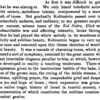1: Diary excerpt, R. Iljisich's "A Yom Kippur at Anton Rubinstein's," 1899.
Anton Grigoryevich Rubinstein (1829-1894), was a Russian pianist, composer, and conductor, known for his virtuosic piano performances in which he played pieces illustrating the entire history of piano music, and for his prolific output of operas, concertos, symphonies, and solo piano works. Born to Jewish parents in the village of Vikhvatinets, in the Podolia Governorate, not far from Odessa, Rubinstein was raised as a Christian following his family’s conversion to Russian Orthodoxy.
In this diary entry, St. Petersburg Jewish journalist Robert F. Iljisich (1834-1909) recounts an intimate performance by Rubinstein at a salon in the Hotel Bellevue in St. Petersburg. He describes Rubinstein as “genuinely Semitic” in his appearance, and explains that although Rubinstein had “long ago passed over into another camp,” he had “remained [a Jew] at heart.” The salon took place on Yom Kippur, and although Rubinstein claims that he was not aware of the holiday, when he takes to the piano he performs a series of improvisational variations on the traditional Ashkenazi tune of Kol Nidre, which transport the diarist into an exquisite moment of prayer.
Suggested Activity: Have your students discuss the following questions: Why is the diarist so moved by Rubinstein’s performance? What is the melody of this prayer, without its words, conveying to him? Does the context (a salon rather than a synagogue) transform the meaning of the tune from a prayer to a performance, according to the diarist? The diarist seems to be invested in the idea of authenticity—Rubinstein as a genuine Jew, despite his conversion and this Kol Nidre as an earnest one despite the setting. Why might he interpret the situation this way?
Ask your students if they can imagine the musical performance. They may wish to listen to a version of the Kol Nidre melody, such as this one (cantorial) or this one (cello). If they are musically inclined, invite them to create their own variations on the tune of Kol Nidre and to describe to the class how it felt to improvise around the tune. How does their improvisation shape their emotional relationship to the melody? And how do their feelings about the melody inform their improvisations?
Source: R. Iljisich, "A Yom Kippur at Anton Rubinstein's," Menorah Magazine, vol 25 (1899), 174-182, https://babel.hathitrust.org/cgi/pt?id=hvd.32044105332720&view=1up&seq=184. Based on a translation from Russian to German by Leon Houchtenberg, in the Zeitung des Judenthums.
1_Iljisich.png
 Download image (348.92 KB)
Download image (348.92 KB)

